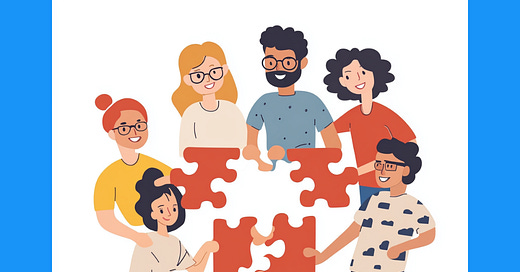In 1936, Dale Carnegie published How to Win Friends and Influence People.
This is probably one of the first timeless self-help bestsellers that come to mind.
It is about developing skills in valuing others and making them feel appreciated rather than manipulated. Isn’t it all that your work fellaz want?
Discover the six ways to make people like you. (Handy for collaboration, that is for sure).
1. Become genuinely interested in other people
Is asking “How are you?” enough? Yes and no.
I had a friend who researched the topic of narcissism in society and found out that the tendencies for individuals and narcissism have been growing.
So, if we are entering a time of pure interest in oneself, what makes you different and likable is to be interested in others.
Things like what people like, what they don’t like, their family/work situation, hobbies, reading desires, etc.
These are all topics you can follow up on and start a conversation. When you don’t talk for a moment about yourself, you see how incredible the people around you are.
Interest is huge these days. Especially since people in the corporate world feel like ‘they don’t care about me.’.
2. Smile.
Who do you approach during your coffee break?
A colleague who sits alone, looking into his cup.
A colleague who stands around and smiles at you.
A colleague who looks grumpy.
A colleague who does not smile back at you.
Your choice.
What makes them and you approachable is the smile. What facial expressions do you have at work?
3. Remember that a person’s name is to that person the sweetest and most important sound in any language.
Names matter.
I went to a networking event some time ago. Everyone there had their cards with QR codes leading to LinkedIn. Weird. Instead of introducing themselves, they just gave you the code to connect.
Remembering other people’s names shows them you remember and care.
How are you with names? Do you keep them in mind, or don’t you register people around you?
E.g., the man from the accounting team, a new Brazilian on the team, etc.
4. Be a good listener. Encourage others to talk about themselves.
People like talking about themselves (most of them).
All you have to do is let them talk. Even if you have similar or even better insights to share.
Let them.
Don’t brag about your higher scores, more positive feedback, and family life. Just let them believe their experience, weekend, and problems are one of a kind.
Listening is a skill.
It could be boring. But worth working on it. You do it for your team culture and collaboration.
So, listen.
5. Talk in terms of the other person’s interests.
You know people like themselves, and are most interested in their goals, needs, hobbies, families, and of course, problems.
Here you’re playing a bit of a fisherman.
If you want to make someone feel understood, respected, and valued, show genuine interest in the things they care about.
When you do, they’ll feel more positively toward you, be more open to your ideas, and be more likely to cooperate or engage.
Example:
Instead of talking about your weekend, ask about theirs.
Instead of: “I spent my weekend working on my car.”
Try: “Did you get a chance to do anything fun this weekend? I remember you mentioned you love hiking.”
This shows you're:
Paying attention,
Making them feel important,
Aligning the conversation with their world.
Why it works:
It appeals to a person's favorite subject — themselves (halejulaaaa).
It builds rapport and trust faster.
It positions you as thoughtful and empathetic, not self-centered (congratulations!).
6. Make the other person feel important – and do it sincerely.
The keyword is sincerely. Flattery is shallow and often transparent. Sincere appreciation, on the other hand, is powerful because it’s earned and real.
People you work with don’t want much, only to be seen, heard, and respected.
Carnegie believed that treating people as important is not just good manners, it’s good human understanding.
Every person you meet is fighting a private battle or carrying unseen responsibilities. Recognizing their efforts and qualities helps them feel acknowledged in a world that often overlooks them.
Example:
You have a tight deadline, and one teammate helps you with a report.
Instead of saying ‘thanks’, you could say:
“I really appreciate the way you jumped in to help with the report yesterday. You caught a few things I missed, and your input made the final version stronger. I know you had your own work to finish, so it means a lot that you took the time.”
Feeling the butterflies in the stomach?
TL;DR
Did I influence you to interact more with people?
Great. Because when people feel seen, they show up like never before.
Have a good one, Ivona





